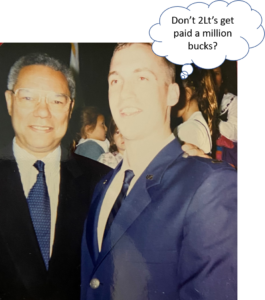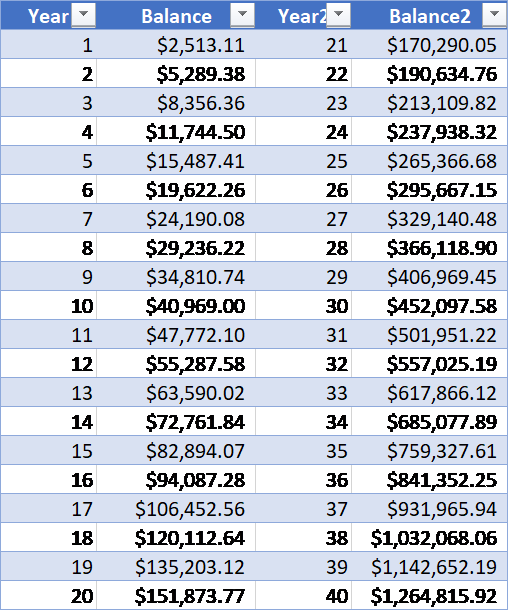
Figure 1. A Penny Doubled for a Month

Your right arm lowers as you speak “So help me God.” You are now a commissioned officer. You’ve earned your bachelor’s degree and perhaps a UPT slot. Congratulations are well-earned. As you start your military career, you have no shortage of tough challenges ahead and you’re probably not too concerned with “how to become a millionaire.” But you should be.
You’re in your twenty’s now, and by current norms you have about 40 years to work and provide for your income in retirement. Social Security alone would won’t pay you enough to eat dog food and live in your car. A military pension and social security are unlikely to provide an acceptable standard of living after 40 years consuming like a normal American. You will need other sources of income in retirement, so you need to begin saving for retirement with your first paycheck and every one thereafter.
In Part 1 of this series, we’re going to examine the Time Value of Money. If you’re going to be a good steward of your money, you have to understand this simple but omnipotent concept.
Time Value of Money
Let’s start with the basics. When you invest your money into stocks and bonds, typically in mutual funds, those investments deliver you periodic payments from the profits and debt of the companies you invest in. If you invest $100 today, and you earn 10% in the first year, you’ll have $110. If you earn 10% the second year too, you get 10% of $110, not $100. Your investment returns earn investment returns- the miracle of compounding. Here’s a really powerful example- imagine you could have $1 million today, or a penny that doubles every day for a month. Which should you take?
Figure 1. makes it pretty clear that a penny doubled (100% interest, compounded daily) is a far better deal than $1 million today because you end up with over $5.3 million by deferring gratification for a month. Now, 100% interest isn’t realistic and 10% could be a smaller stretch depending on the level of risk you can accept. But Albert Einstein captured the two most salient points about compound returns: “Compound interest is the eighth wonder of the world. He who understands it, earns it… he who doesn’t… pays it.” If you want to build a nest egg to live off of in retirement, you’ll need compounding returns on your side.
Unfortunately, earning 100% returns over a 40-year working life is less likely than winning the lottery, but the largest companies in America have earned about 10% average returns over the decades before accounting for inflation.[2] Let’s imagine that you can earn 10% over your 40 years and that you can invest $200 per month. What kind of retirement war chest would that become? Figure 2. shows that you would have over $1.2 million. Not bad, but when you factor in an average 3% of inflation that final number becomes $524,962, less than half of the nominal 10% return!
We’ll come back to inflation, but let’s look at what would happen if waited 10 years to start investing for retirement? Take a look at year 30 in Figure 2., only $452,099- less than half of what you earn with 40 years of returns. Getting started early matters. A lot.
One last example- what if you dial up your investment to $500 per month? At 40 years you’ll have $3,162,039. Now that’s starting to suggest a comfortable retirement!
Inflation is a relentless corrosion of your investment returns and you can’t stop it. You can only try to invest enough dollars, early enough in your career to beat it so you won’t have to lower your standard of living in your “golden years.”
What to do about Time Value of Money and Inflation
From the charts in Figure 1. and Figure 2., it should be clear that it’s time to get started investing your money for retirement. But how do you invest? Where should you invest? What does it cost to invest? What mistakes should you work hardest to avoid when investing? What if you don’t have enough money left in your budget to invest? I was told there would be no math!? This investing stuff is already stressing me out!
Fortunately, investing for your future doesn’t have to be as stressful as the EP of the day. This article can’t cover everything you need to know, but until you read the rest of the “How Lieutenants Become Millionaires” series, consider visiting your installation’s personal financial counselor. These counselors are free, knowledgeable, and able to help educate you as you start your retirement investing. If you choose to seek a commercial financial advisor, I highly recommend seeking a fiduciary, fee-only advisor to minimize conflicts of interest and ensure your interests are always put first. In Part 2, we’ll get your glidepath towards millionaire status started…
[1] The Millionaire Next Door is a fantastic book detailing the habits and truths of self-made first-generation millionaires. It’s required reading for those who intend to build and live a wealthy life!
[2] The S&P 500 average is just below 10%, but is always changing both with annual returns and the companies in that index. Adjusted for inflation, 7% is a better estimate.
Winged Wealth Management and Financial Planning LLC (WWMFP) is a registered investment advisor offering advisory services in the State of Florida and in other jurisdictions where exempted. Registration does not imply a certain level of skill or training.
This communication is for informational purposes only and is not intended as tax, accounting or legal advice, as an offer or solicitation of an offer to buy or sell, or as an endorsement of any company, security, fund, or other securities or non-securities offering. This communication should not be relied upon as the sole factor in an investment making decision.
Past performance is no indication of future results. Investment in securities involves significant risk and has the potential for partial or complete loss of funds invested. It should not be assumed that any recommendations made will be profitable or equal the performance noted in this publication.
The information herein is provided “AS IS” and without warranties of any kind either express or implied. To the fullest extent permissible pursuant to applicable laws, Winged Wealth Management and Financial Planning (referred to as “WWMFP”) disclaims all warranties, express or implied, including, but not limited to, implied warranties of merchantability, non-infringement, and suitability for a particular purpose.
All opinions and estimates constitute WWMFP’s judgement as of the date of this communication and are subject to change without notice. WWMFP does not warrant that the information will be free from error. The information should not be relied upon for purposes of transacting securities or other investments. Your use of the information is at your sole risk. Under no circumstances shall WWMFP be liable for any direct, indirect, special or consequential damages that result from the use of, or the inability to use, the information provided herein, even if WWMFP or a WWMFP authorized representative has been advised of the possibility of such damages. Information contained herein should not be considered a solicitation to buy, an offer to sell, or a recommendation of any security in any jurisdiction where such offer, solicitation, or recommendation would be unlawful or unauthorized.

Figure 2. $200/Month, Hypothetical 10% Return, 40 Years
